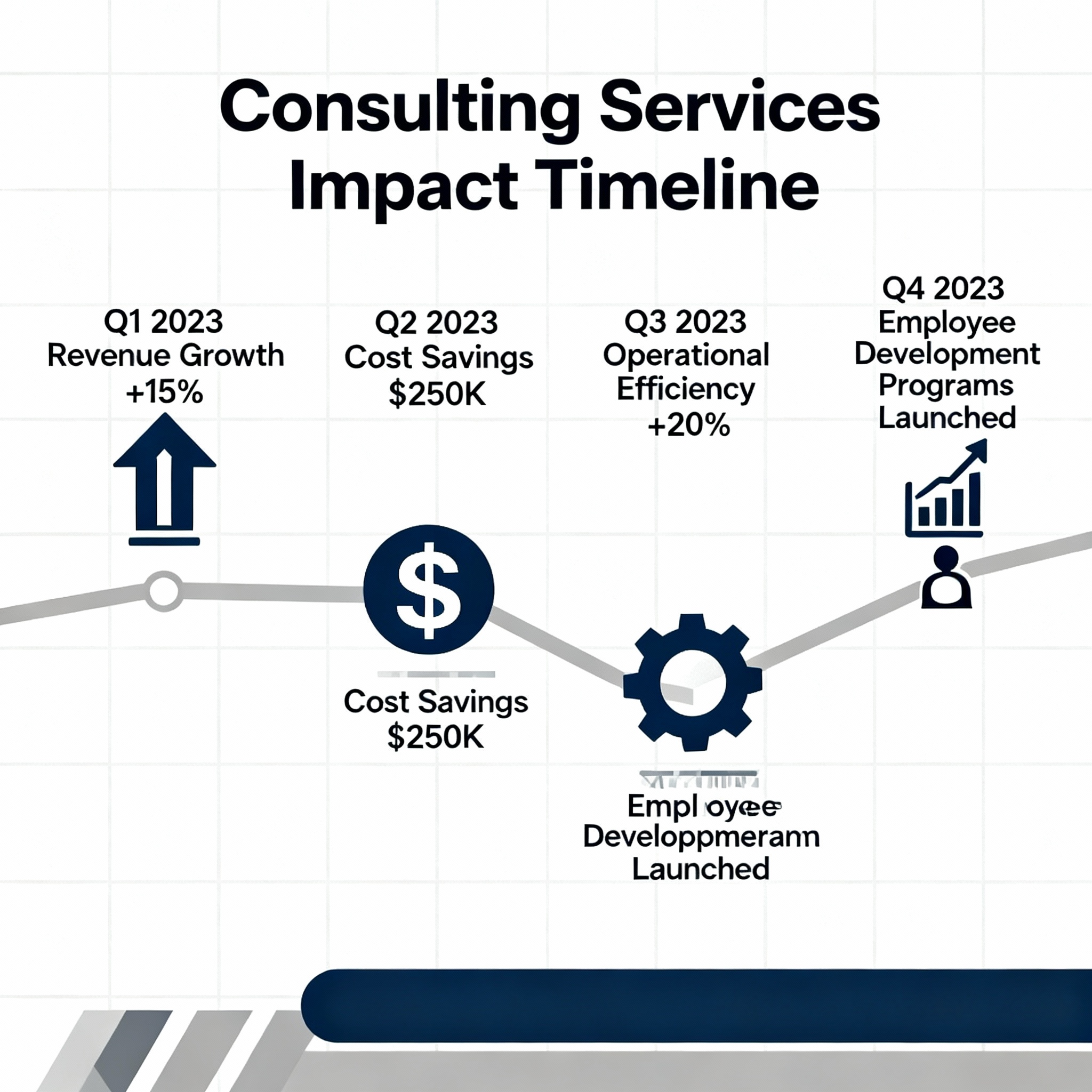Summary
Hiring a business consultant is often seen as a big step for companies that want to grow or fix operational challenges. While some business owners worry about the costs, many find that the knowledge and strategy a consultant provides far outweigh the expense. This blog explains what business consultants do, how they improve companies, and how to measure whether they are worth the investment. You will learn about the roles, advantages, ROI measurement, and key factors to consider before hiring one.
Every business owner faces moments of uncertainty. You might feel stuck, unsure about your next move, or find your company not performing as well as expected. At such times, an outside perspective can make all the difference. That’s where business consultants come in.
A business consultant is a professional who helps companies identify problems, develop strategies, and find opportunities for growth. They analyze your business, offer solutions, and support you in making informed decisions.
But before hiring one, a common question arises: Is hiring a business consultant worth it?
This article explores this question in depth. We’ll discuss how consultants add value, how to measure their impact through ROI, and how to decide if your business truly needs one.
Key Takeaways
- Business consultants bring fresh ideas, expertise, and practical strategies to your business.
- The return on investment (ROI) of hiring a consultant can be measured through revenue growth, cost savings, and efficiency improvements.
- A cost-benefit analysis helps you weigh the consultant’s value against their fees.
- Real-world success stories show measurable business improvements after consulting.
- Assessing your company’s goals and weaknesses helps you decide if hiring a consultant makes sense.
The Role of a Business Consultant

A business consultant’s main job is to improve how a company operates and performs. They analyze your current business situation, identify weaknesses, and create strategies to achieve better results. They can work on short-term projects, such as improving marketing performance, or long-term goals, like restructuring your entire organization.
Their expertise covers a wide range of business areas — from finance and operations to technology and human resources. The most valuable consultants don’t just offer advice; they help you implement the changes needed to achieve success.
Let’s break down their main responsibilities.
Also Read:What is Human Resource (HR) Outsourcing?
Strategic Guidance
Business strategy is the foundation of any successful company. A consultant helps create a clear plan that defines your goals and outlines how to achieve them.
Many companies operate without a well-defined strategy, which can lead to wasted resources and missed opportunities. A consultant reviews your current plans, evaluates market trends, and develops realistic steps to meet your objectives.
For instance, if your company wants to enter a new market, a consultant studies the competition, identifies potential risks, and designs an action plan to minimize losses and maximize growth. Their external viewpoint allows them to spot problems that your team might overlook.
In short, consultants give direction and structure to your business vision.
Operational Improvement
Even profitable businesses face operational inefficiencies. These inefficiencies can result from outdated systems, poor communication, or unclear workflows. Business consultants analyze every process in detail — from production to customer service — and find where time, money, or effort is being wasted.
After identifying the weak areas, they recommend improvements such as automating repetitive tasks, restructuring teams, or introducing performance metrics.
For example, a consultant may notice that a company spends too much time on manual reporting. By suggesting digital tools, they help save time and reduce human error. Over time, these small improvements lead to greater productivity and higher profits.
Financial Expertise
Many businesses struggle to manage their finances efficiently. A business consultant with financial expertise can help in several ways. They assess your current budget, study your expenses, and identify areas where money can be saved or reinvested.
They also assist in creating long-term financial strategies that ensure stability and growth. For example, they may recommend better ways to manage debt, reduce overhead costs, or improve pricing models.
If your company is considering expansion, consultants analyze potential risks and guide you in making sound investment decisions. Their financial insights help you maintain a healthy cash flow and plan for sustainable success.
Technology Integration
Modern business success depends heavily on technology. However, many companies don’t know which tools are right for them or how to use technology effectively.
Business consultants bridge this gap by assessing your technological needs and implementing the right solutions. They may suggest cloud-based systems for data storage, software for customer management, or analytics platforms for performance tracking.
By aligning technology with business goals, consultants improve efficiency and accuracy. This also helps your team focus on strategic tasks rather than manual work.
For instance, introducing an automated inventory system can reduce waste, track sales better, and improve order accuracy — all of which contribute to profitability.
Change Management
Businesses often go through periods of change, such as restructuring, leadership transitions, or new product launches. These situations can be stressful and disruptive. Consultants help manage such changes smoothly.
They create strategies to prepare staff, communicate updates clearly, and ensure that operations continue without interruption.
For example, during a merger, consultants may design an integration plan that aligns the values, systems, and culture of both companies. This minimizes confusion and keeps morale high.
Their main goal is to help your business handle transitions confidently and with minimal resistance.
Knowledge Transfer
One of the often-overlooked benefits of hiring a consultant is knowledge transfer. Consultants don’t just solve immediate problems — they also train your employees to handle future challenges.
They provide workshops, create manuals, and mentor teams so that your staff learns new methods and strategies. This ensures that the improvements last long after the consultant’s work is done.
For instance, a consultant who improves your sales process might train your sales team to use new techniques effectively, ensuring consistent results even after the project ends.
Are Business Consultants Worth It?

The value of a business consultant lies in measurable results. To determine if hiring one is worth it, businesses must look at the return on investment (ROI) — the balance between the benefits gained and the costs involved.
If the consultant’s expertise leads to increased sales, better efficiency, or significant cost savings, then their services are likely worth every penny.
Evaluating the ROI of Consulting Services
Measuring ROI helps determine whether consulting services bring value. The basic formula for ROI is:
ROI = (Benefits − Cost) ÷ Cost × 100
For example, if a consultant charges £10,000 and their strategies increase your profit by £30,000, your ROI is 200%.
But ROI isn’t just about money. It can also include non-financial improvements like better employee morale, improved decision-making, or reduced customer complaints.
Consultants often contribute to both short-term gains and long-term business sustainability, making their impact more valuable over time.
Key Performance Indicators (KPIs) to Measure Impact
To assess the results of business consulting services, focus on key metrics such as:
- Revenue Growth: Did your income increase after the consultant’s involvement?
- Cost Reduction: Were unnecessary expenses identified and reduced?
- Employee Productivity: Has staff performance improved due to better systems or training?
- Customer Satisfaction: Did your business reputation or customer loyalty improve?
- Operational Efficiency: Are tasks being completed faster or with fewer resources?
Tracking these KPIs provides a clear picture of whether consulting services delivered measurable improvements.
Conducting a Cost-Benefit Analysis
A cost-benefit analysis helps compare the financial investment with the value gained. This process involves examining how much the consultant charges versus the direct and indirect benefits they bring.
What is Consulting Costs
Consulting fees vary depending on experience, project size, and industry. In the United Kingdom, the average business consultant earns around £44,053 per year, though top consultants or firms may charge more.
Costs can be structured as hourly rates, project fees, or retainer agreements. Besides direct payment, there may also be internal costs like staff time and implementation expenses.
However, viewing consulting fees as an investment rather than an expense can shift your perspective — because the goal is to generate more value than the cost itself.
Weighing the Benefits
Consultants often deliver results that go far beyond their fee. Some key benefits include:
- Higher Revenue: Better sales strategies and market positioning.
- Lower Costs: Efficient processes that reduce waste and errors.
- Better Decision-Making: Data-based insights that minimize risks.
- Employee Development: Training and motivation to improve team performance.
- Market Adaptability: Guidance to respond quickly to new opportunities.
When these outcomes are achieved, the long-term benefits greatly outweigh the short-term expense.
When the ROI Outweighs the Cost
A consultant’s true value becomes clear when the gains far exceed the cost of hiring them. For instance, if a consultant’s advice helps your company grow revenue by 20% while improving employee efficiency, the overall return is substantial.
In such cases, hiring a consultant is not just worth it — it becomes a strategic move that sets the foundation for continued success.
How to Know If Your Business Needs a Consultant
Not every business needs consulting services, but many reach a point where external help can make a big difference. Identifying the right moment to bring in a consultant is key.
Common Scenarios That Demand a Consultant
- Slow Business Growth: If your sales or profits have plateaued and internal solutions aren’t working.
- Operational Issues: When delays, confusion, or process inefficiencies affect output.
- Financial Struggles: When you’re unsure how to budget, control costs, or manage debt.
- Technology Challenges: When your systems are outdated and limit productivity.
- Major Business Transitions: Mergers, acquisitions, or management changes.
If you recognize any of these situations, hiring a consultant can provide structured solutions and restore progress.
Assessing Internal Capabilities
Before hiring a consultant, review your internal team’s skills. Ask yourself:
- Do we have the expertise to solve these issues ourselves?
- Are our managers overloaded or lacking specialized knowledge?
If your team lacks experience in certain areas, a consultant can fill that gap efficiently. They offer skills and insights that save time, prevent mistakes, and ensure sustainable improvements.
Types of Expertise Offered by Business Consultants
Different consultants specialize in different areas. Choosing one that matches your needs ensures effective results.
- Business Strategy and Growth: Focuses on long-term goals, market positioning, and expansion.
- Marketing and Sales: Improves brand visibility, lead generation, and conversions.
- Financial Management: Enhances budgeting, forecasting, and cash flow control.
- Human Resources and Training: Builds better leadership and improves employee performance.
- Technology and IT Consulting: Introduces digital tools and data systems to improve productivity.
- Operations and Supply Chain: Simplifies logistics, inventory, and overall efficiency.
Understanding these specializations helps you choose the right professional for your situation.
Real-World Success Stories
A real example illustrates the impact of hiring consultants.
A mid-sized manufacturing company faced production delays and rising costs. They hired a business consultant to assess operations. Within four months, production efficiency increased by 30%, and waste reduced by 25%. The improvements saved thousands of pounds annually.
Another example: a small retail business hired a consultant to create a better marketing strategy. The result was a 40% increase in online sales within a year.
Such success stories show that with the right consultant, even small businesses can achieve major improvements.
Making an Informed Decision
Before hiring a consultant, ensure that your decision is based on facts, not assumptions. Consider these points:
- Check the consultant’s experience in your industry.
- Ask for examples of previous success.
- Request a clear plan with measurable outcomes.
- Evaluate their communication and compatibility with your team.
A good consultant should be transparent, collaborative, and result-driven. Hiring the right one ensures that your investment leads to real growth.
Conclusion
So, is hiring a business consultant worth it?
In most cases, yes. Business consultants provide strategic direction, improve performance, and help companies make smarter decisions. They bring external expertise that often leads to measurable growth, cost savings, and long-term stability.
While consulting requires an initial investment, the results — when measured through ROI and business performance — often exceed expectations. The key is to hire the right consultant, define clear goals, and track measurable outcomes.
When done right, business consulting services are not just worth the cost; they are a powerful investment in your company’s future success.
FAQs
How can a business consultant help my business?
A consultant helps identify problems, create strategies, and improve efficiency. They bring expert knowledge that guides better decisions and faster growth.
Is hiring a business consultant worth the investment?
Yes. A good consultant can help you earn more revenue, cut costs, and avoid mistakes, leading to long-term benefits that exceed the initial expense.
How do I know if my business needs a consultant?
If your business growth has slowed, operations are inefficient, or you lack expertise in certain areas, a consultant can provide solutions and clarity.
What expertise do business consultants typically offer?
They specialize in strategy, marketing, finance, HR, technology, and operations — depending on the business need.
Can a business consultant help me adapt to industry changes?
Absolutely. Consultants help businesses update strategies, apply new technologies, and stay competitive in changing markets.
I’m Debabrata Behera, a passionate blogger sharing insights, tips, and stories across diverse topics. Through my writing, I aim to inspire, inform, and connect with readers worldwide.

